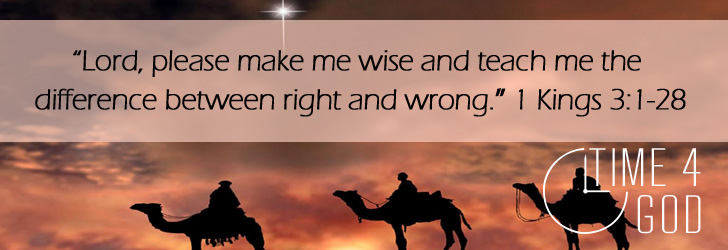Make Me Wise and Teach Me
It is one of the great stories from the Hebrew Testament of the Bible. Solomon succeeds his father, David, as king.

It is one of the great stories from the Hebrew Testament of the Bible. Solomon succeeds his father, David, as king. He’s very young still, and humble enough to know that he needs God’s help to rule his Chosen People. This, of course, is a good sign in a leader. To know that one does not know is the first sign of wisdom, according to the ancient Greek philosopher, Aristotle. Wisdom is what is needed to live a good life, a moral life. It is needed, not just in leaders of every kind, but in each and every one of us. The knowledge needed to be able to discern right from wrong is at the center of our quest for happiness in our lives. This knowledge comes from God alone. Wisdom is the reflection of eternal light. She produces friends of God and prophets.
[content-ad]
The Lord, as we remember, appeared to Solomon and told him to ask for whatever he most desired from him. Solomon famously responded by asking for wisdom and the ability to discern the difference between right and wrong. This, of course, pleased God and he gave Solomon what he requested. The proof is in the famous story about the two women who came before him, each claiming to be the true mother of an infant child. Solomon listens to their arguments and finally calls for a sword, to have the baby split in half, a half of the child for both mothers. When we read this we know that there must be a method behind Solomon’s seeming madness here. And there is. The real mother’s love is so great for the child that she cries out to prevent the child’s death. She tells Solomon to give the child to the false mother, so that her child might live. Solomon sees the love in her and is able to wisely ʺdiscernʺ the right (mother) from the wrong one. The story ends well for the child and his real mother, but also for Solomon, for the people are deeply impressed with his wisdom.
In our post-modern and relativistic times we always hear about the need to give our children something called self-esteem. But as the Solomon story tells us, self-esteem is not something that can be given to a person, particularly a young person. Self-esteem is the result of a long effort of trial and error, of learning from one’s mistakes, of experiencing forgiveness and grace after failure. Self-esteem results from slowly coming to know the difference between right and wrong and, ultimately, the development of moral character. The best way to give our children self-esteem, then, is to be responsible parents, teaching them the difference between what IS right and what IS wrong, with the help of the Church’s teachings and the Scriptures. We need to be teaching them to love the good. We need to be giving them experiences that reveal the value and the reward of choosing the good more and more often, until it becomes a matter of habit for them. When that happens they will truly be free and wise in the moral matters of life. When they develop the habits of moral character, self-esteem will be the natural consequence of their virtuous character. It won’t be some artificial sense of ʺbeing greater thanʺ others. They will not have to name it, or claim it from others. It will be theirs.
The best way for we parents and grandparents to help our children and grandchildren gain ʺself-esteemʺ is to ʺpractice what we preach.ʺ We must be people of humble faith and noble practice, in order for our children to ʺseeʺ the wisdom of choosing to live in accord with the wisdom of God’s way. We must judge and punish with mercy. We must forgive with love. And we must honor God with our very lives at home and in public. The eyes of our children are always on us. So are those of God. Let us desire what Solomon desired from God every day: ʺLord, give us wisdom and the ability to discern what is right and what is wrong.ʺ God will respond to our request as generously as he did with Solomon. Thanks be to God.
SKM: below-content placeholderWhizzco for FHB

